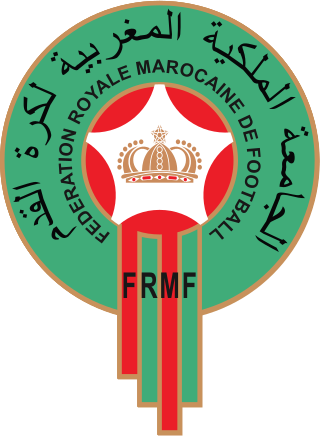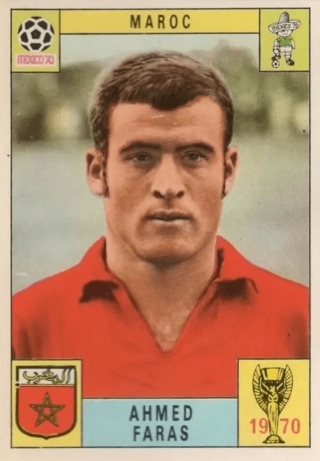Related Research Articles

The Africa Cup of Nations, commonly abbreviated as AFCON and officially known as the TotalEnergies Africa Cup of Nations for sponsorship reasons, is the main biennial international men's association football competition in Africa. It is sanctioned by the Confederation of African Football (CAF) and was first held in 1957. Since 1968, it has been held every two years, switching to odd-numbered years in 2013.

The Nigeria national football team represents Nigeria in men's international football. Governed by the Nigeria Football Federation (NFF), they are three-time Africa Cup of Nations (AFCON) winners, with their most recent title in 2013. In February 2024, the Nigerian national football team was ranked 28th in the FIFA rankings. The team has qualified for six of the last eight FIFA World Cups, missing only the 2006 and 2022 editions. They have reached the round of 16 on three occasions. Their first World Cup appearance was in the 1994 edition. The team is a member of FIFA and Confederation of African Football (CAF).

Egypt national football team, nicknamed "Pharaohs", represents Egypt in men's international football, and is governed by the Egyptian Football Association (EFA), the governing body of football in Egypt.

The Morocco national football team represents Morocco in men's international football, and is controlled by the Royal Moroccan Football Federation, the governing body for football in Morocco.

The Algeria national football team represents Algeria in men's international football, and is governed by the Algerian Football Federation. The team plays their home matches at the 5 July Stadium in Algiers and Miloud Hadefi Stadium in Oran. Algeria joined FIFA on 1 January 1964, a year and a half after gaining independence. They are the current champions of the FIFA Arab Cup.

The Tunisia national football team has represented Tunisia in men's international association football competitions since its inception in 1957. The team is administered by the Tunisian Football Federation (TFF), which governs football in Tunisia. On a continental level, the team competes under the Confederation of African Football (CAF) and is also affiliated with FIFA for global competitions. Additionally, the team is a member of the North African Football Union and the Arab Football Union. The team has qualified for the FIFA World Cup six times, participated in the Africa Cup of Nations on twenty-one occasions, and competed in four editions of Olympic football tournaments. The team is commonly referred to as the "Eagles of Carthage" by fans and media, with the bald eagle serving as its symbol. Their home kit is primarily red and their away kit white, a reference to the national flag. Tunisia's main venue is the Hammadi Agrebi Stadium in Radès, Tunis since 2001.

The Guinea national football team represents Guinea in men's international football and it is controlled by the Guinean Football Federation. They have never qualified for the FIFA World Cup finals, and their best finish in the Africa Cup of Nations was runners-up in 1976. The team reached the quarter-finals in four recent tournaments. The team represents both FIFA and Confederation of African Football (CAF).

The Liberia national football team, nicknamed the Lone Stars, represents Liberia in men's international football and is controlled by the Liberia Football Association. Although the nation produced the 1995 FIFA World Player of the Year, George Weah, its football team has never qualified for the FIFA World Cup and has qualified for the Africa Cup of Nations just twice—in 1996 and 2002. It is a member of both FIFA and the Confederation of African Football (CAF).

The Libya national football team represents Libya in men's international association football and it is controlled by the Libyan Football Federation. The team has never qualified for FIFA World Cup but has qualified for editions of the Africa Cup of Nations in 1982, 2006, and 2012. In 1982, the team was both the host and runner-up. In the Arab Cup, Libya finished second in 1964 and 2012, and third in 1966. The team is affiliated with both FIFA and Confederation of African Football (CAF).

The Mauritania national football team, nicknamed Al-Murabitun in the reference to Almoravid dynasty, represents Mauritania in men's international football. It is controlled by the Féderation de Football de la République Islamique de Mauritanie, and is a member of the Confederation of African Football. They have not qualified for the FIFA World Cup. However, in the Amílcar Cabral Cup, a regional tournament for West Africa, Mauritania came fourth in 1980 on hosting the competition. The national football team of Mauritania later runners-up in 1995, losing on penalties to Sierra Leone after the final finished 0–0.
Christian Chukwu Okoro is a Nigerian former football player and coach. A defender in his playing days, he captained the Nigeria national team to its first win in the African Nations Cup.
Listed below are the dates and results for the 1982 FIFA World Cup qualification rounds for the African zone (CAF). For an overview of the qualification rounds, see the article 1982 FIFA World Cup qualification.

Mouloudia Club d'Alger, referred to as MC Alger or MCA for short, is an Algerian football club based in Algiers. The club was founded in 1921 and its colours are red, green and white. Their home stadium, Ali La Pointe Stadium, has a capacity of 40,000 spectators.The club is currently playing in the Algerian Ligue Professionnelle 1.

Lakhdar Belloumi is an Algerian former football player and manager. A former attacking midfielder, he is widely considered the best Algerian player of all time and one of the best players in Africa. He is said to have invented the "Blind Pass". He was named the fourth-best African player of the century by IFFHS. He holds the record as the most capped Algerian player with 100 national caps and is also the third best goalscorer of the Algerian national team in all time with 28 goals.

Salah Assad is an Algerian former football player and manager who played as a forward.

Ahmed Faras is a Moroccan former professional footballer who played as a striker for Chabab Mohammédia at club level and Morocco internationally.
Mehdi Cerbah was an Algerian footballer who played as a goalkeeper for the Algeria national team.
The Algeria national under-23 football team represents Algeria in international football competitions including the Olympic Games. The selection is limited to players under the age of 23, except during the Olympic Games where the use of three overage players is allowed. The team is controlled by the Algerian Football Federation.
Abdelhamid Sadmi is an Algerian former footballer who played as a defender for the Algeria national team, including at the 1986 FIFA World Cup, and the 1984 and the 1986 African Cup of Nations. At the club level, he spent his entire senior career with JS Kabylie with whom he won the African Cup of Champions Clubs twice, in 1981 and 1990.
References
- ↑ "FIFA Player Statistics: Mohamed KHEDIS". FIFA.com. Archived from the original on 11 November 2012.
- ↑ "Mohamed Kheddis Biography and Olympic Results | Olympics at". Sports-reference.com. Archived from the original on 18 April 2020.
- ↑ Kheddis Mohamed Archived 26 February 2012 at the Wayback Machine , DZ Football
- ↑ "Français". Echorouk Online. 3 September 2012. Archived from the original on 24 July 2011. Retrieved 9 January 2011.
- ↑ "Carnet : Décés de Mohamed Kheddis". Dzfoot.Com. 27 August 2008. Archived from the original on 28 September 2009.
- ↑ "FIFA Player Statistics: Mohamed KHEDIS:". FIFA. Archived from the original on 11 November 2012.